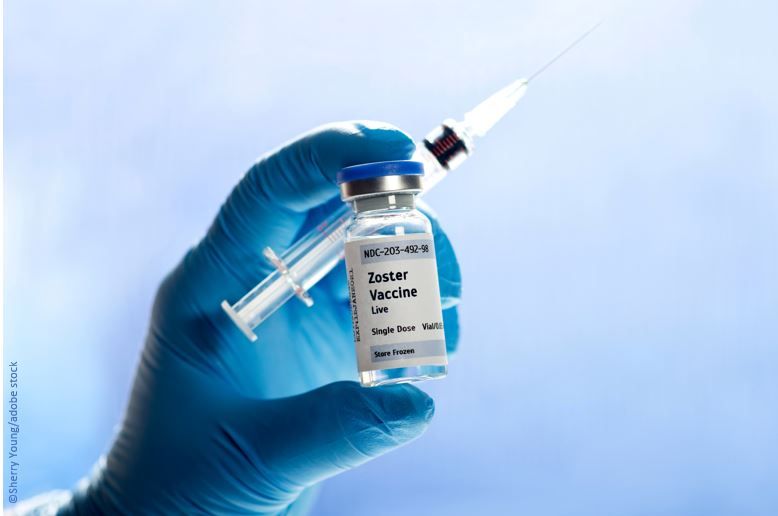- Clinical Technology
- Adult Immunization
- Hepatology
- Pediatric Immunization
- Screening
- Psychiatry
- Allergy
- Women's Health
- Cardiology
- Pediatrics
- Dermatology
- Endocrinology
- Pain Management
- Gastroenterology
- Infectious Disease
- Obesity Medicine
- Rheumatology
- Nephrology
- Neurology
- Pulmonology
Shingles Vaccine Linked to Reduced Cardiovascular Risk in Global Meta-Analysis: ESC Preview
ESC 2025: The first global investigation of evidence for the potential positive connection is encouraging, but more research is needed to understand causality.
Vaccination against herpes zoster is associated with a statistically significant lower risk of stroke and myocardial infarction, suggests findings from the first global systematic literature review and meta-analysis to assess the evidence of an association between the vaccine and cardiovascular events.
©Sherry Young/stock.adobe.com

The analysis, presented at the 2025 European Society of Cardiology (ESC) Congress, found that herpes zoster vaccination was linked to an 18% reduction in cardiovascular events among adults aged 18 years and older and a 16% reduction in adults aged 50 years and older. In studies reviewed for the analysis that reported absolute risk, the rate difference ranged from 1.2 to 2.2 fewer events per 1,000 person-years, according to an ESC statement.
"We looked at the currently available evidence, and found that in this analysis, vaccination against herpes zoster was associated with a lower risk of cardiovascular events, such as heart attacks or strokes," study author Charles Williams, MD, global associate medical director, global medical affairs--vaccines, at GSK, said in the statement. "Further research studies are now needed to find out whether this association can be attributed to an effect of herpes zoster vaccination.”
Research Details
The review included 19 studies overall. Of these, 8 observational studies and 1 randomized controlled trial (a pooled safety analysis of 2 phase 3 trials not designed or powered to assess cardiovascular outcomes) met criteria for inclusion in the meta-analysis. Across these 9 studies, 53.3% of participants were men, with reported mean ages ranging from 53.6 to 74.0 years, according tot the statement.
Williams and colleagues reviewed data from 3 scientific databases for the systematic review and followed Cochrane guidelines for the meta-analysis. The statistically significant lower risk of stroke and MI was observed with both recombinant zoster vaccine (RZV) and live attenuated zoster vaccine (ZVL).
Context and Limitations
According to Williams, the findings are encouraging but must be placed in context. He explained limitations to the available data: "Almost all the evidence came from observational studies, which are prone to bias and shouldn’t be used to infer causality. All the studies used in the meta-analysis aimed primarily to investigate the use of herpes zoster vaccine to prevent shingles in the general population, which may limit the ability to generalise this research to people with a higher risk of cardiovascular events." He reiterated the need for more research in the area to clarify and support the current findings.
Prior research has documented a transient increase in risk of stroke and myocardial infarction following herpes zoster infection, but whether vaccination can reduce this risk remains uncertain.2
Biological Rationale
Shingles, or herpes zoster, results from reactivation of latent varicella-zoster virus (VZV). Approximately 1 in 3 people develop shingles during their lifetime,2,3 with the risk increasing sharply with age and in those with weakened immune systems. The highest burden is carried by adults aged 50 years and older, a population the CDC recommends for the shingles vaccine, individuals who are immunocompromised, and those with chronic conditions such as diabetes or chronic kidney disease carry the highest burden of disease.2,3
The effect on the vascular system may be multifaceted, according to current research. VZV may infect the walls of small and large arteries, leading to inflammation, endothelial changes, and structural remodeling, all of which likely contribute to a higher risk of ischemic events such as stroke.4,5 Evidence of VZV DNA and antigen has been found in affected arteries, and herpes zoster involving the ophthalmic branch of the trigeminal nerve has been linked to a particularly elevated short-term risk of stroke.6
The 75th ESC Congress is being held August 29-September 1, in Madrid, Spain.
References
- New systematic review and meta-analysis shows an association between shingles vaccination and lower risk of heart attack and stroke. News release. European Society of Cardiology. August 28, 2025. Accessed August 28, 2025. https://www.escardio.org/The-ESC/Press-Office/Press-releases/New-systematic-review-and-meta-analysis-shows-an-association-between-shingles-vaccination-and-lower-risk-of-heart-attack-and-stroke#
- Langan SM, Minassian C, Smeeth L, Thomas SL. Risk of stroke following herpes zoster: a self-controlled case-series study. Clin Infect Dis. 2014;58(11):1497–1503.
- Nagel MA, Gilden D. Neurological complications of varicella zoster virus reactivation. Curr Opin Neurol. 2014;27(3):356–360.
- Harpaz R, Ortega-Sanchez IR, Seward JF; Advisory Committee on Immunization Practices (ACIP). Prevention of herpes zoster: recommendations of the ACIP. MMWR Recomm Rep. 2008;57(RR-5):1–30.
- Chen MH, Chen PC, Lin HS, et al. Increased risk of ischemic stroke in young adults with herpes zoster: a nationwide population-based study. Stroke. 2014;45(10):2851–2856.
- Lin YH, Huang LM, Chang IS, et al. Disease burden and epidemiology of herpes zoster in pre-vaccine Taiwan. Vaccine. 2010;28(5):1217–1220.
